University of South Carolina: Learning About Aging Adults,
the Military, et Al.
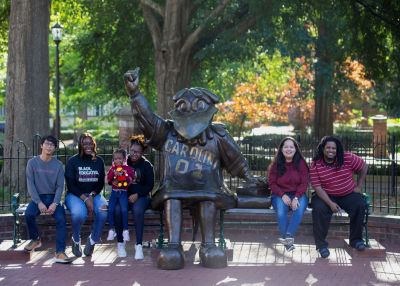
One thing’s for sure at the University of South Carolina College of Social Work: Administrators and professors have their priorities straight on the needs of people living in the state. Two of the college’s main subject areas are gerontology and military social work — and for good reason.
Pictured at right: Go Camecocks! Social work students with the university's iconic "Cocky" statue.
Aging in Place
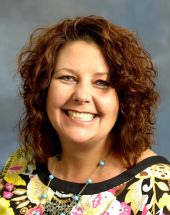
According to the Census Bureau, South Carolina in 2020 ranked 10th of all states in percentage of older adults, at 18.7%. And, as a preferred destination for retirees, that figure is only going to increase. Therefore, says Interim Dean Teri Browne (pictured at right), “we are preparing our students at all levels—undergraduate, master’s and doctoral—to enhance practice in areas that relate to older adults’ health and well-being as well as scholarship into areas that impact older adults today.”
Master’s courses include “Psychosocial Approaches to Gerontology,” “Psychopathology and Psychodiagnostics for Social Work Practice with Adults and Older Adults” and “Programs and Services for Older Adults.” Undergraduate students can take “Social Work with Older Adults and Families.”
The College of Social Work also offers a special National Institute on Aging (NIA)-funded R25 program called “Advancing Diversity in Aging Research” that brings undergraduates from four HBCUs — South Carolina’s Claflin University, South Carolina State University and Allen University, and North Carolina Agricultural and Technical State University — into University of South Carolina faculty labs to get hands-on mentored research in multiple areas of the study of aging, says social work professor
Sue Levkoff, FcD, FM, MSW, endowed chair in SmartHOME, who is the program’s principal investigator.
In addition, Levkoff and Dr. Daniela B. Friedman, MSc, of the university’s Arnold School of Public Health are multiple principal investigators — partnered with Clemson University and the Medical University of South Carolina — for the “Carolina Center on Alzheimer’s Disease and Minority Research.” The NIA-funded P30 program trains minority faculty from the same three South Carolina HBCUs in research to reduce diagnosis and treatment disparities that minorities experience regarding Alzheimer’s disease and related disorders.
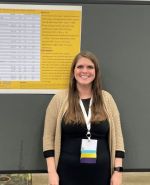
At the doctoral level, the College of Social Work has just launched the Connor Fellows Program on Gerontology, intended to support research on the well-being of older adults and their families in South Carolina and beyond, says associate professor Maryah Stella Fram, PhD Program coordinator. Endowed by the local Sidnah Jo Connor Endowed Fellowship Fund for Social Work, it will fund one PhD student’s research each academic year.
In addition, last summer saw the debut of the Connor Summer Fellows Program, which links a doctoral student to a professor who’s doing gerontological research.
Pictured above: First Connor Summer Fellow, PhD student Sarah Pace.
At Your Service: Military Social Work
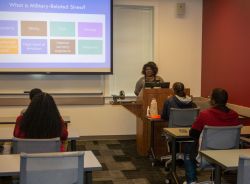
Another major focus for the college is military social work. This should come as no surprise since South Carolina has a large number of military installations.
Dr. Nikki R. Wooten, LISW-CP, who retired as an army lieutenant colonel after 33 years of service, is now coordinator for the Graduate Certificate in Social and Behavioral Health with Military Members, Veterans and Military Families. The 18-credit-hour certificate, she says, “introduces students to what is unique about military social work and about the military population and how it applies to military
mental health.”
Pictured above: Dr. Nikki Wooten, coordinator for the Graduate Certificate in Social and Behavioral Health with
Military Members, Veterans and Military Families, teaches her “Military Mental Health and the Impact of
Trauma” class.
In courses such as Wooten’s “Military Mental Health and the Impact of Trauma” students learn about military-related stressors for servicemen and -women and their families like frequent relocations, deployment- and combat-related injuries, being separated from family, and environmental toxins such as from the burn pits of Iraq and Afghanistan. They also learn about helpful programs from the Departments of Defense and Veterans Affairs, including those focusing on evidence-based treatments for post-traumatic stress disorder and substance abuse, and on the military-to-civilian transition.
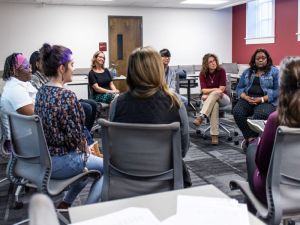
Fieldwork placements for BSW and MSW students interested in military social work include America’s Warrior Partnership, Fort Jackson’s Moncrief hospital in Columbia and Central Midlands Transitional Retreat for homeless veterans in Lexington, as well as a number of Veterans Administration hospitals and outpatient clinics, says Dr. Melissa C. Reitmeier, clinical faculty and director of
field education.
Pictured at left: Social work class with instructor Lana Cook (fourth from left).
Helping Social Workers, Too
Reitmeier is also a key investigator for a $1.7 million federal Health Resources and Services Administration grant, shared with the university’s College of Nursing and College of Pharmacy, to work to reduce burnout in health and mental health professionals. As part of it, three categories of social workers — students, community practitioners and managers — get intensive resiliency training “to give them the tools they need, to change culture, and to reduce the chance of getting a long-term diagnosis of a serious behavioral health disorder,” she says.
“Because of this grant, people are starting to pay attention to this in a real way, not just, ‘Oh, self-care is about getting a latte and a spa day.’”
REACH: Crisis Responders Improve Campus Safety
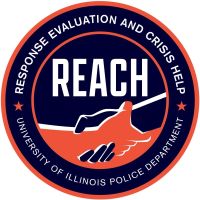
The successful program that teams police with social workers at the University of Illinois Urbana-Champaign
is helping to improve campus safety.
The university police department’s vision for such a “co-responder model” began to germinate over a decade ago, says Rachael F. Ahart, a lieutenant with the department’s Community Outreach and Support Team. By August 2021, under the leadership of new police chief Alice Cary, a formal program called REACH (Response, Evaluation and Crisis Help) was up and running.
Along the way, three of the university’s police officers, including Ahart, obtained MSWs at its School of Social Work and the department began taking on social work interns.
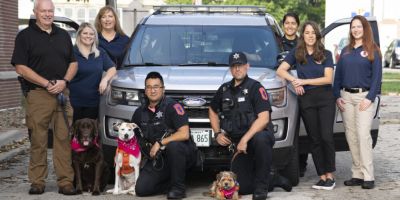
REACH has six officers trained as behavioral health detectives (BHDs) and three crisis responders, i.e., social workers. On calls that might involve a mental health issue, often a suicide threat, the dispatcher will send a team including a BHD, a crisis responder and a therapy K9. The BHD first assesses the situation for potential danger, secures the scene and then steps back to let the crisis responder take over.
Pictured above: REACH team in 2021: (from left) Lt. Tim Hetrick (with therapy K9 Winston), Crisis Responder
Amanda Brockway, Crisis Responder Becky Rowe, Officer Alex Tran (with therapy K9 Lollipop),
Officer Michael Mitrou (with therapy K9 Rosie), Officer Elma Halpin, Crisis Outreach Coordinator
Megan Cambron and Behavioral Health Detective Beth Visel.
As a result, far fewer people are sent to the hospital emergency room, says REACH Crisis Outreach Coordinator Megan Cambron, because crisis responders can do a “pretty high-level” evaluation right on the spot and will often be able to direct the person to community resources instead. If the individual does need to go to the hospital, “they are much more likely to be admitted,” she adds.
Meanwhile, REACH has been contacted by police departments at universities such as California State University Long Beach, as well as a number of municipalities in Illinois and beyond, to see how they might develop a similar program.
University of Minnesota: Making Social Justice More Than Lip Service
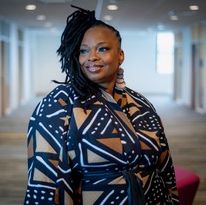
Joan M. Blakey, associate professor and the first Black female director of the School of Social Work, talks about instilling social justice as a core value not only at her school but across the profession.
What has been your most important goal since becoming director?
Emphasizing social justice as being a core value of ours and driving it through the curriculum. Our accreditation has come out with a much stronger stance on it, and it is now explicitly stated as part of our requirements. But I don’t know that the field as a whole is there yet.
What do you mean by that, exactly?
I’m not sure that every single aspect of our [client] support is seen through a social justice lens. I think that we in the field are still grappling with what does that mean, what does that look like? Some of us are clear that it means emphasizing anti-racism as part of practice, but others are like, I don’t know, not so much. So I think the field is dealing with some really tough issues.
What curriculum changes are you planning to try to address that?
I think the hard part is that the curriculum is owned by the faculty. We can go only as far as our faculty are willing to push it. We happen to be in a state that does not ban CRT, so that should help.
In any event, I see curriculum as continually evolving. I don’t think we should ever get to a place where the curriculum is static. Every day we’re learning something new, and there’s more and more information that comes out — better ways of teaching, more engaging ways of teaching. So I believe we should always be thinking about how we can do it better.